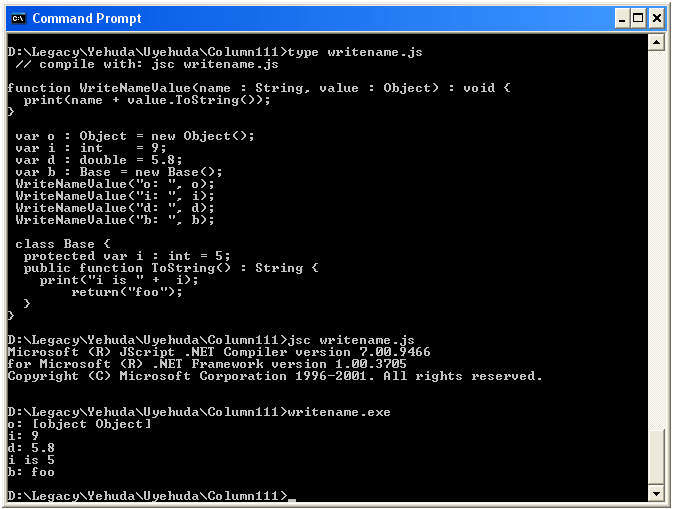JScript .NET, Part V: Polymorphism: Writing a Polymorphic Function - Doc JavaScript
JScript .NET, Part V: Polymorphism
Writing a Polymorphic Function
On Page 4 we saw how to use a polymorphic method, ToString(), and how to redefine it for a new class, Base. Of course, you can define your own polymorphic methods. All you need to do is define your objects in the most basic type, which is Object. All types are derived from Object, so you can pass an integer, a double, and an object of any class to an argument of type Object.
The function WriteNameValue() accepts a name and a value as parameters, and prints them. The name is a string and the value is defined of type Object. In this way, the value parameter can be substituted with any type. The implementation of this utility function is based on the system's polymorphic method, ToString(). You can write your own implementation, making sure you handle each and every type correctly. Here is the function:
function WriteNameValue(name : String, value : Object) : void { print(name + value.ToString()); }
The rest of the code is very similar to that of Page 4. Instead of calling ToString(), we call WriteNameValue(). Here is the code listing:
// compile with: jsc writename.js function WriteNameValue(name : String, value : Object) : void { print(name + value.ToString()); } var o : Object = new Object(); var i : int = 9; var d : double = 5.8; var b : Base = new Base(); WriteNameValue("o: ", o); WriteNameValue("i: ", i); WriteNameValue("d: ", d); WriteNameValue("b: ", b); class Base { protected var i : int = 5; public function ToString() : String { print("i is " + i); return("foo"); } }
And here is the Command Prompt window, showing the code again (writename.js), the jsc compiler's log messages, and the output of writename.exe:

Next: How to implement a polymorphic interface
Produced by Yehuda Shiran and Tomer Shiran
All Rights Reserved. Legal Notices.
Created: June 3, 2002
Revised: June 3, 2002
URL: https://www.webreference.com/js/column111/5.html


 Find a programming school near you
Find a programming school near you